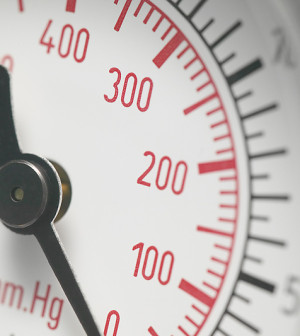- FDA Approves New Antibiotic Against UTIs
- New School Lunch Rules Target Added Sugars, Salt
- Dairy Cows Moved Across State Lines Must Now Be Tested for Bird Flu
- TikTok Riddled With Misleading Info on Health: Study
- Emulsifier Chemicals Are Everywhere in Foods. Could They Raise Diabetes Risk?
- Opioids During Pregnancy May Not Raise Psychiatric Risks for Offspring
- Could Heartburn Meds Raise Your Migraine Risk?
- Drug, Alcohol Abuse Goes Untreated in Many Ex-Prisoners
- Watchdog Group Says U.S. Food Recalls Rose Again Last Year
- Genes Could Mix With Pesticide Exposure to Raise Parkinson’s Risk
Snoring, High Blood Pressure in Pregnancy May Raise Apnea Risk


Pregnant women with high blood pressure who also snore are at high risk for obstructive sleep apnea, a new study suggests.
Researchers cautioned that these women should be screened for the sleep disorder, to avoid complications during pregnancy and delivery.
“Hypertensive pregnant women who report snoring should be evaluated for obstructive sleep apnea since sleep apnea can be treated during pregnancy,” study author Louise O’Brien, an associate professor at the University of Michigan’s Sleep Disorders Center, said in a university news release. She is also an adjunct associate professor in the department of obstetrics & gynecology at the U-M medical school.
Obstructive sleep apnea is a sleep disorder that can cause blood oxygen levels to drop during the night. The telltale sign of this condition is snoring during the night. Obstructive sleep apnea affects up to one-third of women by the last few months of pregnancy, the study authors noted.
The researchers reported that 50 percent of pregnant women who snore and have high blood pressure (or “hypertension”) may have the sleep disorder and not know it. Even if they don’t snore, 25 percent of pregnant women with high blood pressure could also have undiagnosed obstructive sleep apnea.
Obstructive sleep apnea is linked to serious health issues that could negatively affect women and their babies, the study team warned.
“We know that habitual snoring is linked with poor pregnancy outcomes for both mother and child, including increased risk of C-sections and smaller babies,” explained O’Brien, who is also a member of the Institute for Healthcare Policy and Innovation.
Aside from a greater risk for smaller babies or delivering by C-section, the investigators found that pregnant women with obstructive sleep apnea are at greater risk for preeclampsia — a dangerous condition involving extremely high blood pressure and protein in the urine.
More information
The U.S. National Heart, Lung, and Blood Institute has more about sleep apnea.
Source: HealthDay
Copyright © 2024 HealthDay. All rights reserved.










